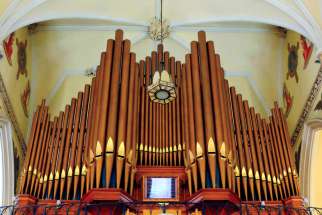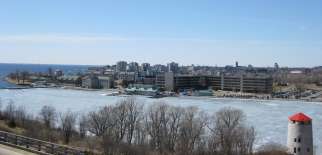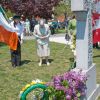Sisters of Providence closing doors on its Printing Room museum
A little piece of history at Providence Manor is closing its doors for the last time in Kingston, Ont.
This is no pipe dream
Even a parishioner listening closely during Mass would not know the meticulous care that Jeffrey Moellman brings to every note he plays on the organ at St. Mary of the Immaculate Conception Cathedral.
Each year in Kingston, we have the honour of hosting our annual St. John Fisher Dinner, a fundraiser which supports the mission of Catholic Christian Outreach at Queen’s University. We invite a distinguished speaker and have been blessed to highlight places where the Church is under persecution.
The unique landscape of my youth fading fast
The Kingston Frontenac Public Library (KFPL) will be withdrawing its new Patron Code of Conduct that some saw targetting the Eastern Ontario city’s homeless and mentally ill population.
Poverty vigil runs its course
For 20 years, the Sisters of Providence of St. Vincent de Paul have lined a small corner in front of Kingston’s City Hall to stand in solidarity with the poor and vulnerable in society.
Sisters to leave legacy with Providence Village
The Sisters of Providence of St. Vincent de Paul are striking out on a bold new future that is rooted in a proud past.
Former Kingston priest nine new sex assault charges
A former priest of the Archdiocese of Kingston faced nine additional sexual assault charges when he appeared Nov. 5 in a Kingston court on previous sex charges.
Regiopolis-Notre Dame marks 175 years of Catholic excellence
Kingston is the mother church of English Canada, the first diocese erected in Upper Canada. Last weekend, we celebrated an important part of that history, marking the 175th anniversary of the oldest Catholic high school in English Canada — Regiopolis-Notre Dame High School.
In 1762, 250 years ago, Alexander MacDonnell was born in the Scottish highlands. He came to Canada in 1804, already in his early 40s, as chaplain of the Glengarry Fencibles. One of the few English-speaking priests in the British colonies, he was made auxiliary bishop of Quebec with responsibility for what would become Ontario. In 1826, when Kingston was made the diocese for all of Upper Canada, MacDonnell was appointed the first bishop.
At the age of 75, just three years before his death, Bishop MacDonnell petitioned the legislature of Upper Canada for a new college, originally planned as a seminary for the training of future priests. The old bishop provided better than he could have known. In 1837, Regiopolis (Latin for "Kingston") College was incorporated and became a college for men, not exclusively a seminary, just a few years later in 1840, soon after MacDonnell died.
His successor, Bishop Remigius Gaulin, sought to provide for the education of girls by inviting the Congregation of Notre Dame to open a school. Two sisters arrived from Montreal in 1841, and Bishop Gaulin gave them MacDonnell's residence as a location for the new school, which opened with 12 girls. Taking its name from the CND sisters, Notre Dame high school for girls flourished on the same site in downtown Kingston for well over a century, until the 1960s.
Over at Regiopolis College, the school did so well that it was granted a Royal Charter in 1866, meaning that it could grant university degrees. But finances were tight and Regiopolis closed in 1869. It fell to Kingston's first archbishop, James Vincent Cleary, to reopen Regiopolis in 1896 as a secondary school. The boys' high school continued as an archdiocesan venture, although entrusted to the Jesuits from 1931 to 1971.
In the days before provincial funding for Catholic high schools, the continuation of Regiopolis for boys and Notre Dame for girls was an impressive achievement, depending on sacrificial tuition payments from families and constant fundraising by the Catholic community. But by the late 1960s, sustaining both schools became too much, and in 1967 the two schools were merged into the new co-educational Regiopolis-Notre Dame (RND). Full funding came in 1984, and RND marked its 150th anniversary by shifting from diocesan and religious control to that of the local government-funded Catholic school board.
It's hard to overestimate the impact of RND on the Catholic Church in Ontario. For 150 years, it was Catholic secondary education, touching every Catholic family in the Kingston area. Register readers felt that impact too. Both long-time columnist Msgr. Thomas Raby and recently deceased publisher Fr. Carl Matthews were graduates of Regiopolis.
The 175th anniversary was marked by the completion of a new chapel, dedicated in honour of the foundress of the Congregation of Notre Dame, St. Marguerite Bourgeoys. The school's principal, Wayne Hill, a champion of Catholic education who understands the importance of preserving and promoting the Catholic identity of our schools, desired the new chapel as a concrete sign that the Lord Jesus, present in the Holy Eucharist, is the heart of a Catholic school. The stately and serene new chapel, which opens immediately off the entrance foyer, succeeds in doing just that.
The dedication ceremonies stressed the importance of Catholic education, and the sheer longevity of RND makes the point in historical terms. The Catholic Church has been about education for centuries, and the local community in Kingston has been at it since before Confederation.
In a time when there is friction between the provincial government's education bureaucracy and the Catholic system, it is worth remembering that the provincial bureaucracy is the junior partner in education. They have the money thanks to the coercive power of taxation, but not similar experience nor competence. The arrogance and arbitrary power of the education bureaucracy needs to acknowledge that long before it existed, Catholics knew how to establish and operate excellent schools.
Regiopolis was established the same year that Queen Victoria ascended to the throne. The school has been operating long enough to witness not only the diamond jubilee of Victoria in 1897, but also the diamond jubilee this year of Queen Elizabeth II. Mr. Hill was wise to highlight that long record of specifically Catholic excellence, a record older than Canada itself, and one that Catholics ought to be proud of, and committed to protect.
Kingston MPP John Gerretsen walks a mile in poor’s shoes
The Sisters of Providence in Kingston, Ont., are hopeful there may be more “food in the budget” some day soon after a positive response from local MPP and Attorney General John Gerretsen to an organized “food tour” of the eastern Ontario city.
Tara Kainer, social justice advocate with the Sisters of Providence, planned the event for the MPP for Kingston and the Islands so Gerretsen could “spend a few hours in the shoes of someone on social assistance, to see what it’s like.”
KINGSTON, ONT. - A simple yet dignified ceremony held May 19 on the waterfront of this southeastern Ontario city marked a tragic local anniversary: The death of more than 1,400 Irish immigrants fleeing the 19th-century potato famine.
Ireland’s Ambassador to Canada, Ray Bassett, laid a wreath on behalf of the Irish government in commemoration of the estimated 50,000 Irish immigrants who came through the area in 1847 fleeing Án Gorta Mór, “The Great Hunger.” Of those, an estimated 4,300 arrived in Kingston after contracting typhus on crowded “coffin” ships, with 1,400 dying after coming ashore to what was then a town of only 10,000 residents.
Parents fight to save Kingston school
After educating Catholic youth for 60 years in the Strathcona Park community in Kingston, Ont., the doors to St. Paul Catholic Elementary School, among others, may permanently close following the local school board’s accommodation review process.
But there is a voice to St. Paul which is not letting the school be put to rest quietly. Shortly after word filtered out in 2011 that St. Paul could be among the schools targetted for closure by the Algonquin and Lakeshore Catholic District School Board, Sarah Mignault and several other concerned community members began the Save St. Paul Action Committee.











